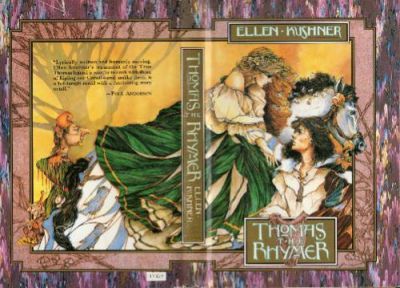Let the Devil Take Tomorrow
Thomas the Rhymer
By Ellen Kushner

27 Sep, 2016
0 comments
Ellen Kushner’s 1990 Thomas the Rhymer is a standalone reinterpretation of the traditional ballad. It won both the World Fantasy Award and the Mythopoeic Award.
Gavin and wife Meg are odd friends for someone like Thomas. Gavin and Meg live quiet lives on their farm, while Thomas is a wandering minstrel who has, or so he claims, played at court. At first, Gavin and Meg offered the stranger shelter, as good people would. Later, he becomes something of an adopted son to the childless couple.
There are many reasons why the farm holds such an attraction for Thomas, not least of which is young Elspeth, who lives on a nearby farm.
Elspeth is clearly attracted to Thomas and he to her, but she proves strangely resistant to Thomas’ charms. It is almost as though the consequences of a casual dalliance could be far more serious for her than for Thomas. Resistance only focuses Thomas’ interest. Who knows? Perhaps if he had had enough time, he might have won Elspeth.
Elspeth has a rival. The farm girl might have cut out another woman, even one of Thomas’ aristocratic paramours. She has no chance against the Queen of the Fairies. Thomas vanishes, dead for all anyone knows. He does not return for seven years. When he does, he is a transformed man.
~oOo~
If you had asked me at 10 AM today “How sure are you that this was part of Terri Windling and Mark Allen Arnold’s Fairy Tale series?” I would have answered “Enough to bet the mortal souls of everyone save me on the 11:29 Route One to Fairview.” In retrospect I see 1 that I was misled by the Thomas Canty cover (of which I cannot find a decent reproduction). Thomas the Rhymer was from William Morrow, while the Fairy Tale series was from Ace and Tor. Ah, well. No harm from mistakes as long as one learns from them.
Nota bene: I have a terrible allergy to traditional ballads and folk tales of Great Britain, as I feel they do not focus sufficiently on steam engines, economics, and the other fruits of the Scottish Enlightenment. I cannot compare the novel to the work that inspired it.
I heartily approved Kushner’s choice to tell Thomas’ story from several points of view: curmudgeonly Gavin, kindly Meg, Thomas, and Elspeth. Each has their own perspective; the people around him may sometimes be judgemental but the person to whose eyes Thomas is least sympathetic is Thomas himself. Not that he is a terrible person … but any woman of sense would be cautious around such an easily distracted young man.
Kushner’s fairies are as inhuman as mantises, bound by rules alien to humans, often cruel … but not without positive qualities. They don’t lie (a trait they share with Thomas) and while mercy is not a default part of their nature, they are capable of it.
Although a considerable portion of the book deals with the seven years Thomas spends in the court of the Fair Folk, it’s a surprisingly down-to-earth novel. Thomas nearly dies of exposure at the beginning of the book, poverty and worse are never far away, and of course, there is always the possibility that his paramours will conceive. The fact any hill might open into a gateway into the kingdom of the elves does not mean the sheep living on those hills won’t still need to be fed. Elspeth isn’t going to languish like a Waterhouse figure,

waiting for the man who vanished without a word to her to return. With or without Thomas, life continues.
Thomas the Rhymer is available here.
1: Something in Kushner’s ISFDS entry I did not expect:
Magazine Editor Series
